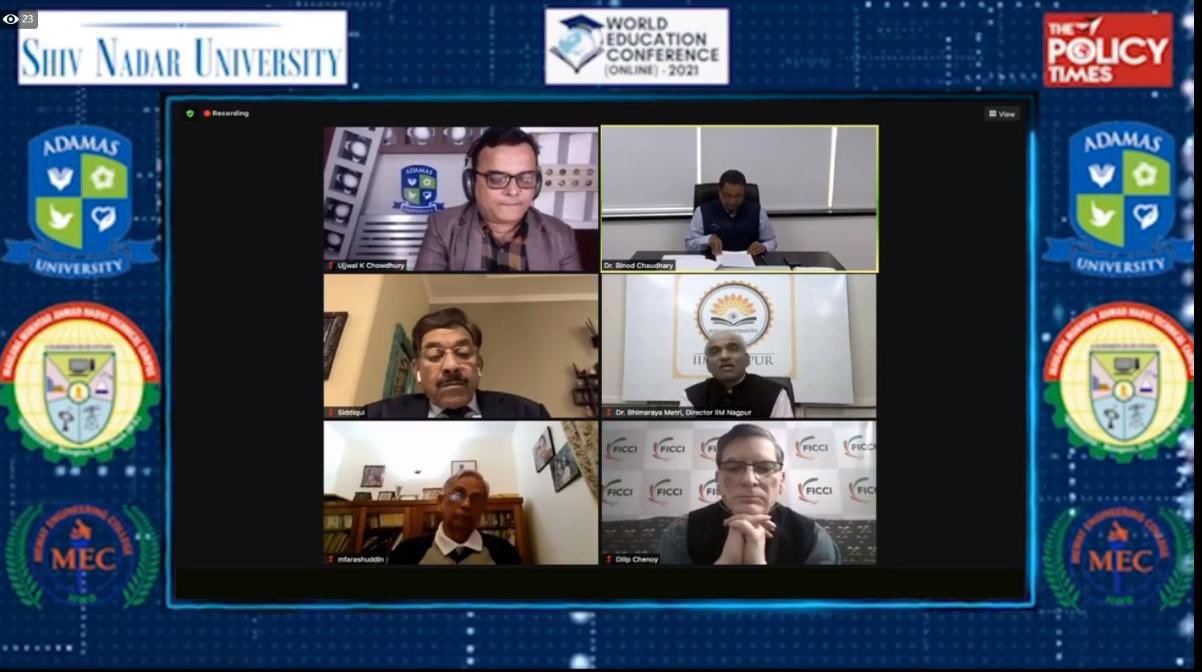The World Education Conference 2021 Commemortaes with Manish Sisodia, Dr. Binod Chaudhary and Mr Dilip Chenoy
New Delhi: The year 2020 has been a historical year for quite an unforgettable pandemic that has lead to a monumental change in the existing process and composition of orders in every other system and the education system is no exception to the effecting change brought forward by the global pandemic.
And to bring the inclusive and positive change to our education system, The Policy Times collaboration with, Shiv Nadar University, an institution for eminence in the education field organized World Education Conference 2021. The three-day event is being organized from 15-17th January 2021 digitally. The main agenda of the event is to explore a workable roadmap for all-inclusive sustainable and productive education worldwide. The inauguration ceremony was graced by the presence of Chief Guest of the event Shri. Manish Sisodia, Deputy Chief Minister & Hon’ble Minister of Education, Government of Delhi NCT , and Guest of Honour Mr. Mohibul H. Chowdhoury, Hon’ble Deputy Minister ,Ministry of Education ,Government of Bangladesh.
The first day of The World Education Conference was divided in three sessions and each of them held quite insightful discussions on issues prevalent in our education system and if dissected and discussed and taken under proper re-shaping, could bring quite a monumental change in our education system.
The Chief Guest of the first plenary session was Dr. Binod Chaudhary, Chairman-CG Corp Global, Nepalese Billionaire, and Businessman & Philanthropist. The deliberations happened around “National Education Policy 2020 – Future of Education & Implementation Roadmap”. This session brings light to the New Education Policy 2020 that was approved by central authority and is expected to implement this year. The NEP 2020 has envisioned a new education system by reforming quite a few key areas and Successful implementation of the National Education Policy (NEP2020) demands a long-term vision, availability of expertise on a sustained basis, and concerted action from all concerned encompassing National, State, institutional, and individual levels to have a proper comprehension of the building basis and structure of NEP 2020 and the implementation procedure and devising a workable roadmap for future implementation of NEP 2020.
Mr. Chaudhary one of the most inspiring businessmen and philanthropic spoke about education being the fundamental right of the citizens that helps people to judiciously adapt to other key aspects of life. He strongly believes “Education is an important fundamental aspect of human life, considered as one of the most valuable gifts bestowed upon humanity. He further says, ‘I believe that each person continuously learns and grows throughout their lives and this ability to capture the right information and adopting it becomes more heightened with proper education. It is the very weapon that becomes the light of hope even in the grimmest of the situations regardless of personal or professional life”.
He emphasised his mantra behind his tireless work is ‘business with purpose’ to create a difference in the lives of global community through quality education .He rightly set a glowing example to his brethren in the business community to their righteous purpose and responsibility to the world at large.
Mr. Chaudhury rightly said “India and Nepal has one of the largest youth compositions in the world which makes it even more paramount to effectively and meticulously evolve the education framework to part articulate knowledge.” This remarkably inspirational man shed an unprecedented ray of hope for the young generation of Nepal along with global community of young people. His organization CG Education, the educational vertical of CG Corp Global is also playing “a pivotal role in reshaping the education scenario in Nepal, India, and other countries in Asia & overseas to provide quality education. Their philanthropic work categorically focuses on education to empower the young talent to create a world of educated, independent, liberal, and rational young professionals.”
His globally renowned autobiography ‘Making It Big’ an insightful and inspirational journey into his life was showcased at the session.
Dr. MK Shridhar, Member, NEP Draft Committee, a pillar to building NEP 2020 started the session with his key note speech key notes speech for the session. He highlighted unique views essence of NEP 2020 delightfully as according to him the clear and concise purpose of NEP 2020 was to democratise education.
Mr. Anees Kutty, Founder of Evergreen Foundation & Anees Defence Career Institute (ADCI), Pune, Dr Chetan Singai, Chief Consultant, Technical Secretariat, NEP-2020, & Associate Professor, School of Social Sciences, Ramaiah University of Applied Sciences and Deputy Director, Ramaiah Public Policy Center, Bengaluru, KA, India were present as honourable speaker for the session and all of them lead a delightful discussion that hopefully could see a successful implementation of NEP 2020.
The guests of this session were experienced representatives from academia and industry. Mr Dilip Chenoy, Secretary General, Federation of Indian Chambers of Commerce &Industry (FICCI), emphasized on quality education that can signal the need for the diverse industry and better industry exposure at every educational level contributes to industry and academia correlation. . FICCI is also bringing lots of new initiatives to reach to educational institutes and bring industry and academia collaboration by practical approach.
Mr. S.Y. Sidiqqui, Executive Advisor, Maruti Suzuki India Limited believes the better solution to harmonious accord of industry academia is the education should adapt the mandate to build the character of an industrialist. Prof (Dr.) Mohammed Farashuddin, Founder Vice Chancellor and Chief Adviser Professor, East West University, Bangladesh has suggested towards curriculum update to that of industry need and industry experience while pursuing academia and academic institution to incubate entrepreneurship.
The discussion brought forward what kind of contribution could come from both academia and industry and how we could build a successful collaboration between the two and hopefully this leads to people from both field to see the path to collaboration in better light that could be beneficial to both industry and academia.

